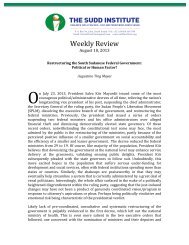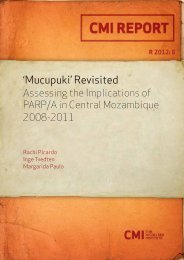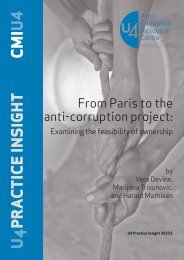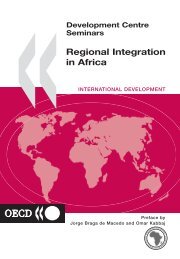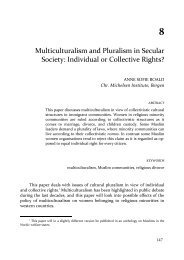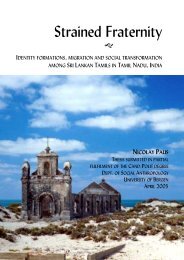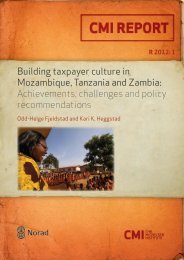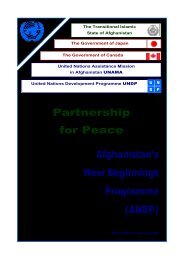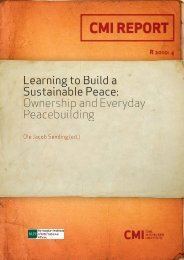Peacebuilding: Lessons for Afghanistan? - CMI
Peacebuilding: Lessons for Afghanistan? - CMI
Peacebuilding: Lessons for Afghanistan? - CMI
Create successful ePaper yourself
Turn your PDF publications into a flip-book with our unique Google optimized e-Paper software.
• a package of activities undertaken in so-called post-conflict situations, 1 typically<br />
coordinated by the UN or through other common mechanisms. In this sense, the<br />
concept evolved during the 1990s and presently entails a broad range of activities<br />
designed to establish public order, undertake economic recovery and<br />
reconstruction, and develop institutions in the judicial, administrative and political<br />
sectors (state and civil society).<br />
"Peace-building" in the first sense has been undertaken at the local level in<br />
<strong>Afghanistan</strong> by non-governmental organisations and at least one UN agency. Plans <strong>for</strong><br />
"peace-building" in the second sense have not been prepared by the UN and the<br />
international aid community until now, after the fall of the Taliban and the<br />
establishment of a transitional government in Kabul.<br />
Previously, continuous violence had made it impossible to develop a comprehensive<br />
package to rebuild the state and the economy. Yet, the UN attempted at various times<br />
during the 1990s to negotiate a political framework <strong>for</strong> peace, and international aid<br />
agencies as well as bilateral donors provided relief and limited reconstruction<br />
assistance. Numerous international and national NGOs had projects on the ground.<br />
Towards the end of the 1990s, the international aid community developed fairly<br />
elaborate mechanisms to coordinate assistance and integrate political, aid, human<br />
rights and peace considerations within a common framework. The result was known<br />
as the Strategic Framework and Principled Common Programming.<br />
The 1990s consequently offer a set of rich experiences that are relevant to the current<br />
phase, ranging from micro-level projects to attempts by the UN to coordinate aid<br />
policy in a difficult political context.<br />
1 As social scientists have pointed out, conflict is endemic to most social processes. The task of peacebuilding<br />
is not to eliminate social conflict, but to ensure that it is resolved in non-violent ways. While<br />
"post-crisis" is a more appropriate term, "post-conflict" has been widely used in the international aid<br />
community and has been institutionalised by the World Bank and other agencies. See e.g. Post-Conflict<br />
Reconstruction: The Role of the World Bank, Washington: The International Bank <strong>for</strong> Reconstruction<br />
and Development, 1998.<br />
(www.worldbank.org/servlet/WDSContentServer/WDSP/IB/1998/04/01/000009265_<br />
3980624143531/Rendered/PDF/multi_page.pdf ) and other publications prepared by the Post-Conflict<br />
Unit of the World Bank.<br />
2



